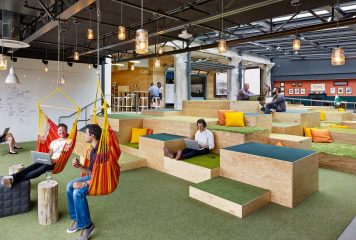Written by Holtby Turner
Today, the reality of ‘going to work’ has shifted dramatically. Deloitte’s Millennial Survey of 2016 reported that no less than seventy-five percent of millennials expect to be able to “work from home or other locations where they feel more productive”.
The percentage is likely to be higher among zillennials. As today’s younger generation has a self-confessed obsession with what is known as ‘productivity hacking’, so they challenge notions of working in spaces that are not optimised for productive work. So what does this mean: is the future of work going to be defined by digital nomads?
Perhaps it will, yes. Take the open plan office; once heralded as the ultimate way to increase teamwork and communication in an office, it rapidly grew in popularity when designing and organising workspaces. These days, however, open plan offices are being panned. As a recent study from Harvard University shows, open plan lowers face-to-face interactions and spikes time emailing. Millennials took note and cafes got their vote.
Who Are Digital Nomads?
Digital nomads try to move away from workspaces that aren’t as productive as promised, and instead search for alternatives. Look for instance at the massive increase in co-working spaces. These serve as intelligent hubs for digital nomads, who often pick spaces not just for their amenities but also for their ambiance and adaptability. Now, as companies look for the best person for the job – which does not mean the best person within the UK – procuring experts from a globalised talent pool makes the future of workspace look very different from the office blocks we’re used to.
The Impact On The Built Environment
What this means for those of us working in the built environment is that we need to start asking new kinds of questions about workspaces. We need to realise that the office needs to become more than an office. In rethinking the office as a value-adding hub in the new world of work, there are questions we need to ask.
What do our workspaces offer?
Historically, workspaces offered things that most people couldn’t find elsewhere. This included things we today barely even think about; things like stationery, a calm place to work, a desk. Today, when access to ink and paper is universal, and with the possibility to work almost anywhere, the value of office staples has decreased radically. In order to be meaningful in the new world of work, offices need to up their offerings: this is why we see co-working spaces offering yoga classes, business mentoring lunches and a studio for recording podcasts or vlogs.
Offices for the new world of work need to become far better at offering ways for teams to work efficiently together, for distributed teams to stay in touch, and for high talents to have access to cutting-edge technology. If staff feel more productive elsewhere, this should be a wake-up call to upgrade the office.
Are our offices built for work-life balance?
As metropolises like London grow, issues such as living costs and traffic can become make-or-break for the new digital nomads. Spending an hour or two in traffic increases no-one’s productivity, and the costs associated with living in city centres can limit a company’s capacity to attract younger top talent. So why not rethink work and the office to reflect this? By allowing more remote work we can improve the family life of employees, ensuring greater (not lesser) productivity. In the future, workplaces may well become something to visit once or twice a week, and with amenities to further enhance work-life balance – such as in-house wellness services and the likes.
Are we designing space for the mixed work-life?
Remote work is not an either/or. The new digital nomads are happy to come into the office, when it makes sense. In the future of work, we will probably stop obsessing over working in an office versus working remotely. Instead, most if not all employees will do both, choosing their mix according to what makes them most productive. New technologies will make this ever easier, and smart companies will already start investing in ways to support this. Virtual reality conferencing will in all likelihood become the new normal, and AI-aided team management tools will make control less of an issue.
Some of the leading technology startups have already started making this new world of digital nomads a reality. It is only a matter of time before pioneering companies in the built environment take the leap. Offices won’t disappear, but they will need to change to keep up with the future. As new technologies make this easier, so fresh new talent will demand it.



